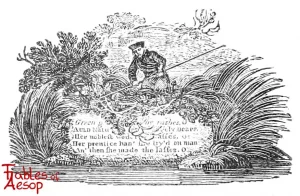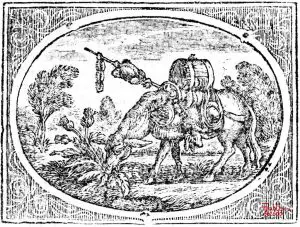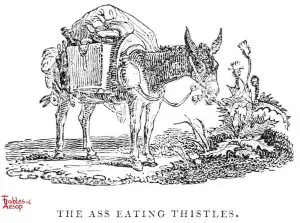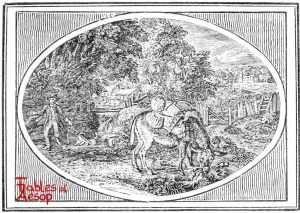An Ass carrying goods to the field stopped and ate a Thistle. While most would question this, the Thistle is a favorite of the Ass.
People enjoy what they enjoy.

JBR Collection
An Ass laden with very choice provisions, which he was carrying in harvest-time to the field, for the entertainment of his master and the reapers, stopped by the way to eat a large and strong Thistle that grew by the roadside.” Many people would wonder,” said he, “that with such delicate viands within reach, I do not touch them; but to me this bitter and prickly Thistle is more savoury and relishing than anything else in the world.”

Samuel Croxall
AN Ass was loaded with good provisions of several sorts, which, in time of harvest, he was carrying into the field for his master, and the reapers, to dine upon. By the way, he met with a fine large thistle, and being very hungry, began to mumble it; which, while he was doing, he entered into this reflection; How many greedy epicures would think themselves happy, amidst such a variety of delicate viands as I now carry! but to me, this hitter, prickly thistle is more savoury and relishing, than the most exquisite and sumptuous banquet.
THE APPLICATION
Happiness and misery, and oftentimes pleasure and pain, exist merely in our opinion, and are no more to be accounted for, than the difference of tastes. That which is one man’s meat is another man’s poison, is a proposition that ought to be allowed in all particulars, where the opinion is concerned, as well as in eating and drinking. Our senses must inform us whether a thing pleases or displeases, before we can declare our judgment of it; and that is to any man good or evil, which his own understanding suggests to him to be so; and not that which is agreeable to another’s fancy. And yet as reasonable and as necessary as it is to grant this, how apt are we to wonder at people for not liking this or that, or how can they think so and so! This childish humour of wondering at the different tastes and opinions of others, occasions much uneasiness among the generality of mankind. But if we considered things rightly, why should we be more concerned at others differing from us in their way of thinking upon any subject whatever, than at their liking cheese or mustard; one, or both of which, we may happen to dislike? In truth, he that expects all mankind should be of this opinion, is much more stupid and unreasonable than the Ass in the fable.

Thomas Bewick (The Ass Eating Thistles)
An Ass was loaded with provisions of several sorts, which he was carrying home for a grand entertainment. By the way, he met with a fine large Thistle, and being very hungry, immediately eat it up, which, while he was doing, he entered into this reflection: How many greedy epicures would think themselves happy amidst such a variety of delicate viands as I now carry! But to me, this bitter prickly Thistle is more savory and relishing than the most exquisite and sumptuous banquet.
APPLICATION.
Temperance and exercise may be regarded as the constituents of natural luxury. It is not in the power of the whole art of cookery, to give such an exquisite relish and seasoning to a dish, as these two will confer on the plainest fare. Indolent epicures have no true taste: they subsist entirely by whets and provocatives of appetite; but he whose stomach is braced and strengthened by exercise, has a whet within himself, which adds a poignancy to every morsel that he eats. Providence seems to have carved out its blessings with an equal hand, and what it has denied to the poor in one way, it has amply supplied them with in another: if it have withheld riches, it has given them a greater store of health; and if it have refused them the means of luxury, it has at least formed them with the capacity of living as happily without it. And it may further be observed, that if we except hereditary diseases, almost every other ailment may be laid to the account of indolence, intemperance, or anxiety of mind.

A young man carrying what may be a long-handled scythe is approaching water in the foreground. Either side of him are big clumps of rushes and other low-growing foliage which tumbles forward over an inscribed rock. On this we read ‘Green gr … he rashes, O’ and the penultimate verse of Burns’s poem. Partly obscured, it reads,
Auld Natu …. vely Dears
Her noblest work…. asses O.
Her prentice han’ she try’d on man.
An’ then she made the lasses. O.
The youth is about to cut away the obscuring vegetation. His tam-o-shanter and plaid proclaim him Scottish. Perhaps Bewick deliberately placed this Scots image after the fable about the ass which relished thistles. – The Bewick Society


